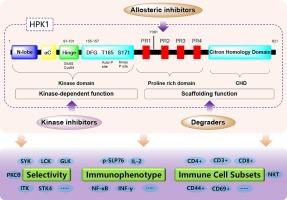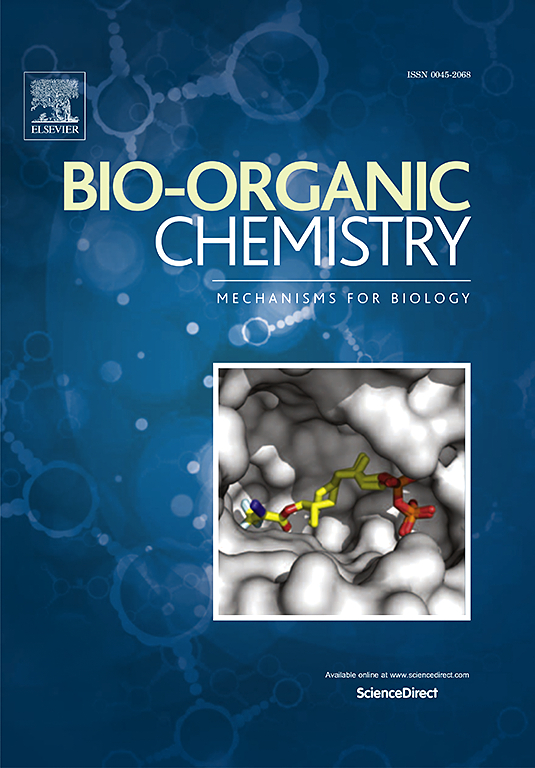癌症免疫疗法中靶向 HPK1 的机遇与挑战。
IF 4.5
2区 医学
Q1 BIOCHEMISTRY & MOLECULAR BIOLOGY
引用次数: 0
摘要
造血祖细胞激酶 1(HPK1,又称 MAP4K1)是一种造血特异性丝氨酸/苏氨酸激酶,属于 Ste20 相关蛋白激酶 MAP4K 家族。HPK1 已被确定为 T 细胞受体信号转导的负调控因子。近年来的研究表明,抑制或敲除HPK1激酶的功能可有效缓解T细胞衰竭,增强T细胞功能,提高肿瘤免疫治疗的疗效。近年来,以 HPK1 为靶点的小分子化学药物取得了重大进展,成为肿瘤免疫治疗药物研发的热点。然而,靶向HPK1的小分子药物面临着选择性有限、免疫刺激不足、HPK1的非激酶支架功能在肿瘤免疫反应中的作用不明确等诸多挑战,阻碍了小分子药物的发展。本综述简要介绍了HPK1的生物学结构及其在肿瘤免疫中的相关信号通路,系统讨论了靶向HPK1的小分子化学药物的最新研究进展。最后,我们总结并展望了以肿瘤免疫中的HPK1为靶点的小分子化学药物在药物研发中面临的机遇和挑战。本文章由计算机程序翻译,如有差异,请以英文原文为准。

Opportunities and challenges for targeting HPK1 in cancer immunotherapy
Hematopoietic Progenitor Kinase 1 (HPK1, also known as MAP4K1) is a hematopoiesis-specific serine/threonine kinase that belongs to the MAP4K family of Ste20-related protein kinases. HPK1 has been identified as a negative regulator of T-cell receptor signaling. Recent studies have indicated that the inhibition or knockout of HPK1 kinase function can effectively alleviate T cell exhaustion, enhance T cell functionality, and improve the therapeutic efficacy of tumor immunotherapy. In recent years, small molecule chemical drugs targeting HPK1 have made significant progress and have become a hot topic in the research and development of tumor immunotherapy drugs. However, the advancement of small molecule drugs that target HPK1 is hindered by various challenges, including the limited selectivity, insufficient immune stimulation, and the ambiguity surrounding role of non-kinase scaffold functions of HPK1 in tumor immune responses. This review briefly describes the biological structure of HPK1 and its related signaling pathways in tumor immunity, systematically discusses the latest research progress in small molecule chemical drugs targeting HPK1. Finally, we summarize and prospect the opportunities and challenges in the drug development of small molecule chemical drugs targeting HPK1 in tumor immunity.
求助全文
通过发布文献求助,成功后即可免费获取论文全文。
去求助
来源期刊

Bioorganic Chemistry
生物-生化与分子生物学
CiteScore
9.70
自引率
3.90%
发文量
679
审稿时长
31 days
期刊介绍:
Bioorganic Chemistry publishes research that addresses biological questions at the molecular level, using organic chemistry and principles of physical organic chemistry. The scope of the journal covers a range of topics at the organic chemistry-biology interface, including: enzyme catalysis, biotransformation and enzyme inhibition; nucleic acids chemistry; medicinal chemistry; natural product chemistry, natural product synthesis and natural product biosynthesis; antimicrobial agents; lipid and peptide chemistry; biophysical chemistry; biological probes; bio-orthogonal chemistry and biomimetic chemistry.
For manuscripts dealing with synthetic bioactive compounds, the Journal requires that the molecular target of the compounds described must be known, and must be demonstrated experimentally in the manuscript. For studies involving natural products, if the molecular target is unknown, some data beyond simple cell-based toxicity studies to provide insight into the mechanism of action is required. Studies supported by molecular docking are welcome, but must be supported by experimental data. The Journal does not consider manuscripts that are purely theoretical or computational in nature.
The Journal publishes regular articles, short communications and reviews. Reviews are normally invited by Editors or Editorial Board members. Authors of unsolicited reviews should first contact an Editor or Editorial Board member to determine whether the proposed article is within the scope of the Journal.
 求助内容:
求助内容: 应助结果提醒方式:
应助结果提醒方式:


